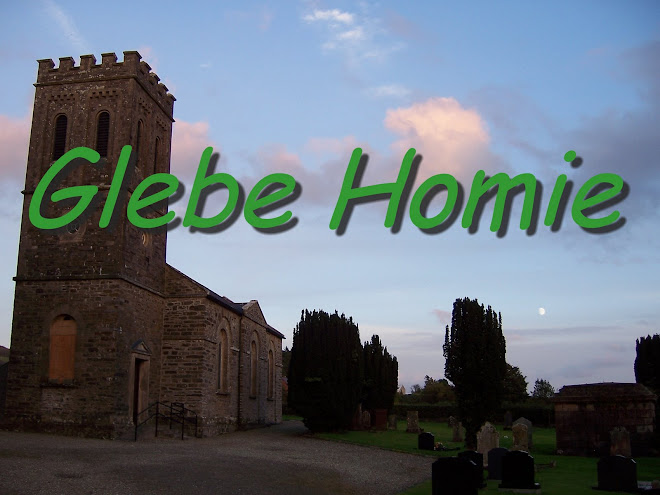Gif A o wan'rer aboon wud be.
Cud the Deil bot haud
o mair cautious covenanter frae grace
wi' hiz rowtin mooth?
O' crabbit wan'rer, whan hae ye brung
o mair fasher oure o haverl soul?
B'gaun ye glaikit gowk!
Mae ruckle hairt weel be heard!
Ye'll mak nae wun'in fire here!
o'beedude29/July/07
It has become obvious to me through the work-shopping of "O' Wasterly Gale" that I have not been transparent enough with the overall intent of what the finished piece will look like. So let me now take a moment to try to clarify, in hope that by doing so, some of you will come to see the method to my madness. I am after all: a Methodist in practice and by nature.
The story of "O' Wasterly Gale" is a microcosm of the Ulster-Scot Culture. The main characters: "The Gilmour Boys" were raised in a section of
Now, It was never my intent to write a "Popular Novel" such as Steven King or J. K. Rowling would write, and I have from the beginning intended to create a document that accurately portrays the life that they lived, it was therefore a conscious intent on my part to tell the story through their words in their way. To this end I endeavored to teach myself enough Ullans to write the dialogue in their native tongue. As they wrote mostly the way in which they were taught in school, I chose to write text in English. You who are reading this right now, read and write in English. You the reader are therefore not a familiar. Hence, dialogue in Ullans among familiars, text in English not among familiars. At a later point in the novel when faced with others in
It is also quite apparent to me that the readership for this work will consist of Academics, people of Ulster-Scots heritage with a vested interest, the Ullans speaking population of
Again, I do not consider myself to be a "Popular Novelist". It is the intent of this work to convey some "answers and keys to the self" as Stephen King would say. A compelling and truthful account of what life for these people was like. It is based on the letters of my ancestors which have been handed down to me through four generations of familiars. Familiars who read, spoke of, and found some sense of self reflected in the struggle and sacrifice of their forbearer's.
The Arc of the complete work, will follow, and does actually parallel, what Joseph Campbell in his seminal work "The Hero With A Thousand Faces" and James Joyce in "Finnegans Wake" termed the "Monomyth". James Gilmour, the main character and primary writer of "The Gilmour Family Letters", ventured forth with his siblings from his world of common day
During his journey and quest he experienced many things, the awe of the adventure, the splendor of sleeping in the "Congress Hall", the flurry of the (first) Battle of Bulls Run, and visiting "John Browns Prison-Cell" at
As it happens, towards the end of the war, a certain James Gilmour dug himself out of Libby Prison at
Listed in the 1869 NYC directory right next store to Robert Gilmour's Cooperage is one James Gilmour doing business selling Collars.
In the novel I intend to treat these persons as one semi-familiar, who may or may not be the actual James of the letters. A kind of spectral personage of James in the form of a cousin that Robert feels bound to by his desire for James to be alive. In other words: the Hero returned to the World of the Living, back from his mysterious adventure in the Land of the Dead, to bestow boons upon his fellow man. This then would complete the Arc of the Hero: separation-initiation-return as outlined in the magnification of the Monomyth formula.
Pretty dry stuff? Many think so, still others think not. Time, and the persistence of my own quest, will determine if the fire of the forge, produces metal tempered to match the forces aligned against its completion, in a form the voices of my ancestors will receive gladly.
obeedude 17/Aug./07
Again, as I posted before:
*Ullans: "Ulster-Scots" is basically the same as "West Central Scots" (the language of Rabbie Burns), a Germanic tongue of common origin with English. Scots is the most defining characteristic of the Ulster accent, most Ulster-Scots who have visited other parts of the English speaking world will testify that more often than not, they are mistaken as being from Scotland rather than Northern Ireland. While broad Ulster-Scots is only spoken in the more rural communities, everyone in Northern Ireland uses Ulster-Scots words and phrases in their everyday speech.
Source: www.theulsterscots.com/speech.htm


No comments:
Post a Comment